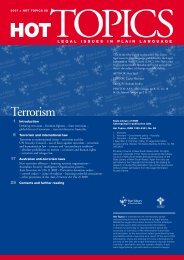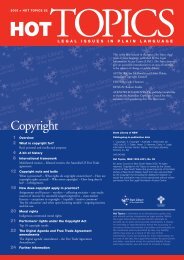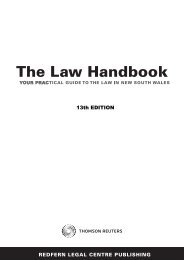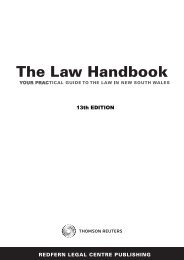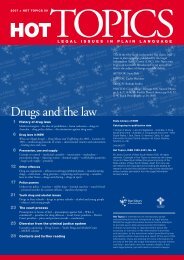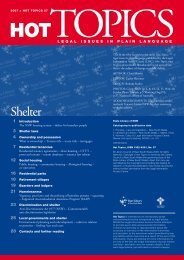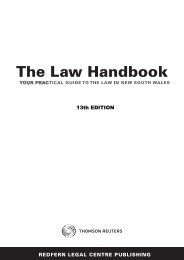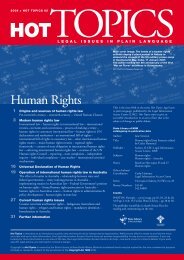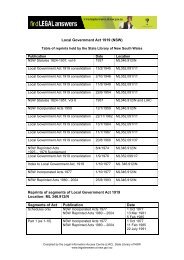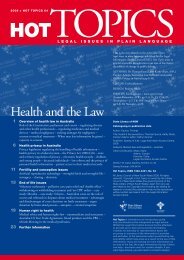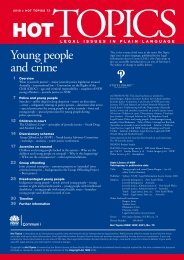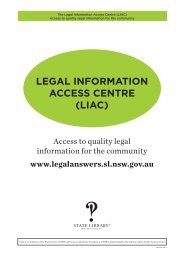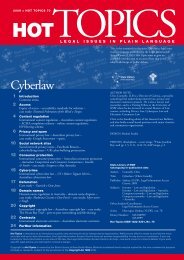Guide to termination and unfair dismissal rights of - Legal ...
Guide to termination and unfair dismissal rights of - Legal ...
Guide to termination and unfair dismissal rights of - Legal ...
- No tags were found...
Create successful ePaper yourself
Turn your PDF publications into a flip-book with our unique Google optimized e-Paper software.
7 The new, <strong>and</strong> somewhat st<strong>and</strong>ardised, industrial awards under the FWAct are referred <strong>to</strong> as “Modern Awards”. The “ModernAwards” are the result <strong>of</strong> an extensive modernisation process undertaken by the former AIRC. More information on “ModernAwards”, their application <strong>to</strong> job/work specific categories <strong>and</strong> the terms <strong>and</strong> conditions they set out may be obtained fromFWA <strong>and</strong> the FWA website: fwa.gov.au Also refer <strong>to</strong> Pt 2-3.“Enterprise Agreements” are enforceable collective agreements covering the employment conditions <strong>of</strong> a group <strong>of</strong>employees <strong>and</strong> their employer. “Enterprise Agreements” can include single or multi-enterprise agreements <strong>and</strong> must meet anumber <strong>of</strong> tests before they can be approved by FWA. “Enterprise Agreements” in effect sit on <strong>to</strong>p <strong>of</strong> the relevant “ModernAward” <strong>and</strong> may provide for additional (above award) remuneration <strong>and</strong> more flexible enterprise specific work practices.Refer <strong>to</strong> Pt 2-4.8 Pt 2-2 Div 11.9 The coverage <strong>of</strong> the FWAct is now extensive throughout Australia, creating a national system <strong>of</strong> industrial relations <strong>and</strong>employment laws. As at 1 January 2010 NSW, South Australia, Tasmania, the ACT <strong>and</strong> the Northern Terri<strong>to</strong>ry had referredtheir industrial relations powers <strong>to</strong> the Commonwealth. (Vic<strong>to</strong>ria had done so in 1996). There are some limitations <strong>to</strong>the referrals <strong>and</strong> some NSW laws with some relevance <strong>to</strong> employment continue <strong>to</strong> be in force. In NSW as a result <strong>of</strong> thereferral, all non government sec<strong>to</strong>r employees in NSW are now covered by the FWAct. The referral does not affect NSWgovernment employees, employees <strong>of</strong> NSW government agencies <strong>and</strong> employees <strong>of</strong> local government in NSW. State ownedcorporations are part <strong>of</strong> the referral <strong>and</strong> therefore employees <strong>of</strong> a state owned corporation are covered by the FWAct.10 s117(1).11 s117(2)(b).12 s123(1)(a).13 s123(1)(a).14 s123(1)(a).15 s123(1)(b). The Fair Work Regulations contain a definition <strong>of</strong> serious misconduct for the purposes <strong>of</strong> the FWAct in regulation1.07.“1.07 Meaning <strong>of</strong> serious misconduct(1) For the definition <strong>of</strong> serious misconduct in section 12 <strong>of</strong> the Act, serious misconduct has its ordinary meaning.(2) For subregulation (1), conduct that is serious misconduct includes both <strong>of</strong> the following:(a) wilful or deliberate behaviour by an employee that is inconsistent with the continuation <strong>of</strong> the contract <strong>of</strong>employment;(b) conduct that causes serious <strong>and</strong> imminent risk <strong>to</strong>:(i) the health or safety <strong>of</strong> a person; or(ii) the reputation, viability or pr<strong>of</strong>itability <strong>of</strong> the employer’s business.(3) For subregulation (1), conduct that is serious misconduct includes each <strong>of</strong> the following:(a) the employee, in the course <strong>of</strong> the employee’s employment, engaging in:(i) theft; or(ii) fraud; or(iii) assault;(b) the employee being in<strong>to</strong>xicated at work;(c) the employee refusing <strong>to</strong> carry out a lawful <strong>and</strong> reasonable instruction that is consistent with the employee’scontract <strong>of</strong> employment.(4) Sub regulation (3) does not apply if the employee is able <strong>to</strong> show that, in the circumstances, the conduct engagedin by the employee was not conduct that made employment in the period <strong>of</strong> notice unreasonable.(5) For paragraph (3) (b), an employee is taken <strong>to</strong> be in<strong>to</strong>xicated if the employee’s faculties are, by reason <strong>of</strong>the employee being under the influence <strong>of</strong> in<strong>to</strong>xicating liquor or a drug (except a drug administered by, or takenin accordance with the directions <strong>of</strong>, a person lawfully authorised <strong>to</strong> administer the drug), so impaired that theemployee is unfit <strong>to</strong> be entrusted with the employee’s duties or with any duty that the employee may be called upon<strong>to</strong> perform.”Subregulation 1.07(1) above makes clear that the ordinary meaning <strong>of</strong> serious misconduct is preserved <strong>and</strong> thensupplemented <strong>and</strong> qualified by the remainder <strong>of</strong> the regulation. The types <strong>of</strong> conduct that may amount <strong>to</strong> serious misconductare not curtailed by the regulation. Accordingly the case law remains relevant. In any event the focus on “wilful or deliberatebehaviour” is consistent with the case law. The case law does make clear that incompetence is not serious misconductjustifying summary <strong>dismissal</strong>; Re Jeffery Williams v Printers Trade Services [1984] FCA 68. It should be noted that the<strong>unfair</strong> <strong>dismissal</strong> provisions <strong>of</strong> the FWAct do not contain the words “serious misconduct”. Therefore the above definition is notstrictly applicable in <strong>unfair</strong> <strong>dismissal</strong> proceedings where an employer responds <strong>to</strong> the claim asserting that the employee hasengaged in serious misconduct, however the definition may still have some relevance.16 Casual employment is not generally defined for all purposes in the FWAct. Consequently it is necessary <strong>to</strong> refer <strong>to</strong> the caselaw on point. The Full Bench <strong>of</strong> the AIRC has described a class <strong>of</strong> employees who are true casuals where employment ischaracterised by “informality uncertainty <strong>and</strong> irregularity” <strong>and</strong> contrasted that with another class <strong>of</strong> employees who work a“regular pattern <strong>of</strong> hours with an ongoing employment relationship”. The AIRC concluded that the latter class <strong>of</strong> employees20



